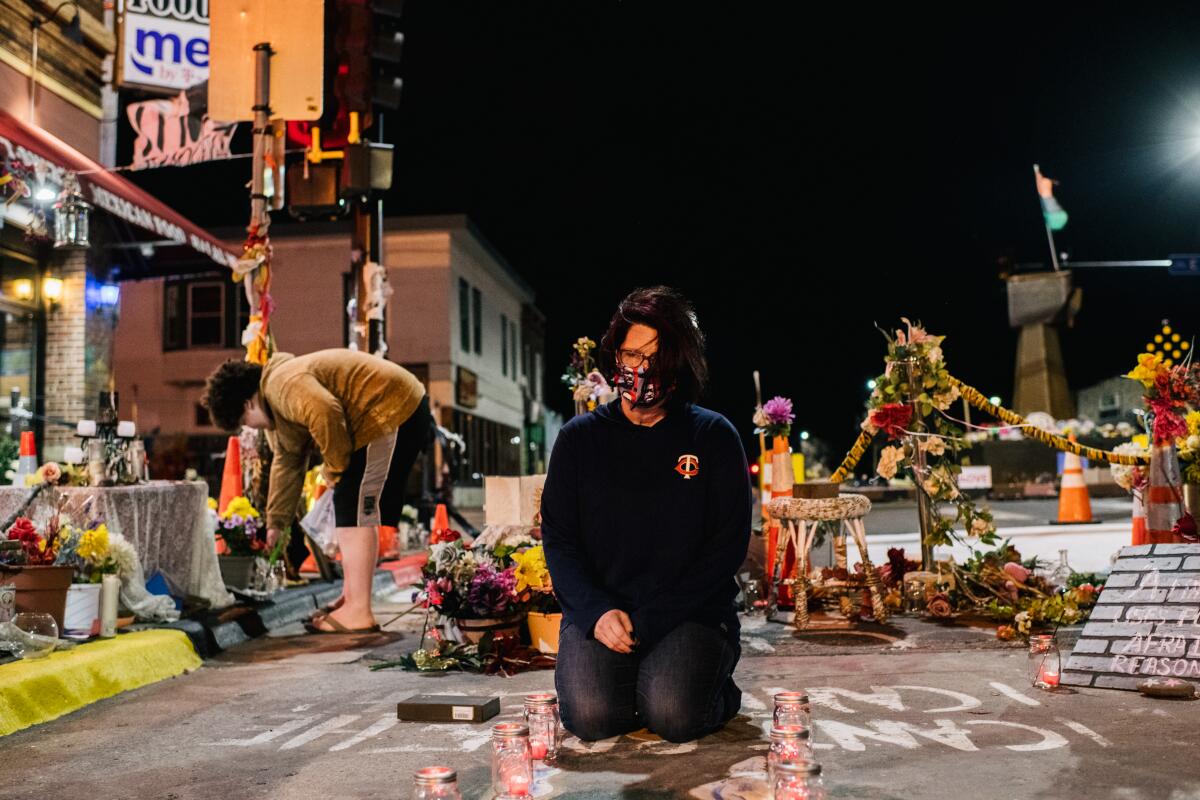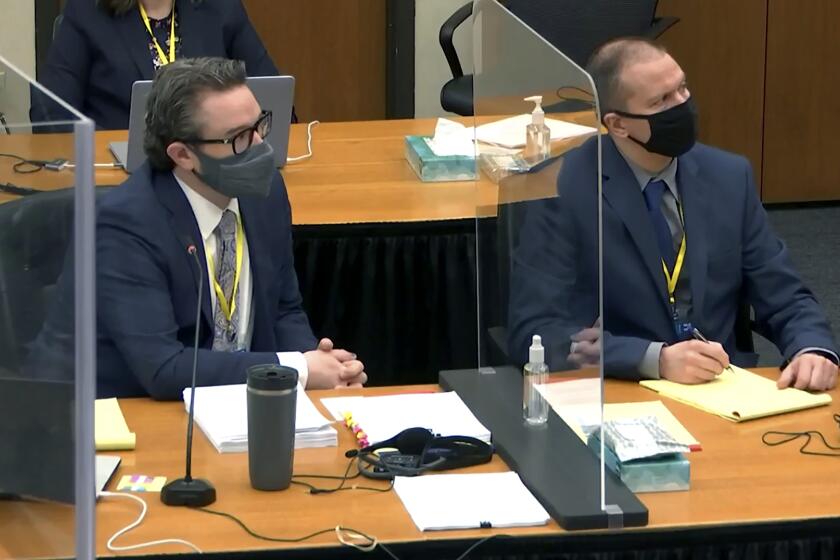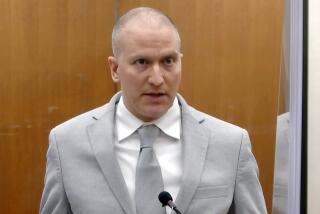Op-Ed: Derek Chauvin is in the courtroom, but the character of Black people is on trial in Minneapolis

- Share via
With the romance of last year’s George Floyd moment in the rearview mirror — the massive protests against anti-Black racism rolling in seemingly inexhaustible waves through the summer — we have reached the moment of the Derek Chauvin trial. This is progress; an officer has been charged with second- and third-degree murder and second-degree manslaughter after many agonizing years of police killing Black suspects in front of witnesses or on video with few legal consequences.
Yet anxiety is already gathering about whether the former Minneapolis cop will be convicted of squeezing the life out of Floyd by pressing a knee to his neck for a horrifying 9 minutes and 29 seconds — even though the world watched it unfold, even though it seems impossible to refute.
As much as Chauvin belongs in a courtroom, we have to remember that courthouses are another place where too many persuasive cases of excessive force, abuse and murder of Black people have gone to die, especially if, in rare cases, the defendants are police.
The criminal justice system overall remains ground zero for structural racism in America, where it all begins. There are many reasons why, but the one under discussion now is how it takes just a soupçon of reasonable doubt — one slightly unconvinced juror among 12 — to thwart justice. Our antiracism awakening notwithstanding, we can all agree that there is more than enough skepticism circulating in this nation about the character of Black people to sink even the clear-cut cause of George Floyd.
The character of Black people is what is always on trial — their humanity and their presumed innocence called into question. Character assassination is fundamental to structural racism; it precedes it. Chauvin’s lawyers are going to argue technicalities, that Floyd was killed by cardiac arrest, that he was in bad health and used drugs, and never mind the knee on the neck. It’s not surprising from a legal standpoint: Everyone is entitled to a defense.
But really, what the defense is arguing is that Floyd died because he didn’t deserve to live. He was a big Black man, sporadically employed and, yes, a drug user. He had prior encounters with police (significantly, details of one of those encounters will be allowed into evidence). In short, he was marginal. That he would die young and badly was just a matter of time and circumstances, in any case not a reason to send a white man to prison, especially a police officer, gainfully employed and just doing his job.
Such are the aspersions cast on Black victims, particularly men and boys who have gone before Floyd. Rodney King, Devin Brown, Trayvon Martin, Tamir Rice, Michael Brown, Philando Castile. Even those with aspirations who can’t be written off as marginal, like emergency medical tech Breonna Taylor, are undermined by this narrative of criminality and inherent Black unworthiness.
In 2013, Trayvon Martin was transformed from a typical teenager who’d ventured out to buy his favorite candy into a scowling, hoodied gangbanger with a shady past and no future to speak of. We like to think we’ve learned something since then because hundreds of thousands took to the streets to heroize Black everyman George Floyd. But in the real world, that anonymity is exactly what doomed him.
Jurors in the case of George Floyd’s death bring their biases to the job. Justice turns on their ability to keep their promise in voir dire to hear out each side and take the law seriously.
The Chauvin trial began with the video, and who knows how many times it and others will be played and replayed. I remember uneasily what happened during the 1992 criminal trial of the four police officers accused of assaulting Rodney King, how that shocking mother of all police brutality videos was examined and reexamined until the jury and some of the public were convinced, however subconsciously, that King was the aggressor, that the cops were just doing their job, however zealously, and that there was reasonable doubt that a crime had been committed. The blurry images contained the damning truth about what happened to King that night, and the larger truth about the anti-Blackness driving police culture. But we didn’t see the beating with just our eyes. We saw it with our hearts, our fears, our hyperconsciousness about where we fit in the social hierarchy.
It doesn’t help George Floyd’s case that in these times, facts matter so little, that shameless elected officials will routinely tell us that what we see plainly is not there: Last year’s presidential election was not won fairly by Joe Biden; Donald Trump was robbed.
In the poisonous atmosphere of the Big Lie, the obvious reality of racism can easily escape recognition. Of course, conservatives have always argued that racism is a figment of the liberal imagination, but now they declare it with a righteousness and open hostility that’s shockingly new, and old at the same time. Facts and data, including videos, are utterly beside the point when they contradict the white supremacy that’s politically essential to roughly half the country. In that sense, the Floyd case couldn’t have come at a worse time.
On the other hand, would there ever be a good time?
Last year’s protests kicked off a reckoning whose time had definitely come, even though the middle of a once-in-a-century pandemic looked like the worst moment possible. And we are still in that moment’s aftermath: The grieving and the newly radicalized keep the flowers fresh in front of Cup Foods where Floyd died, in a kind of ongoing vigil. The Chauvin trial, however it goes, will be a part of the reckoning, for good or ill. Whatever the verdict this time, the reckoning will continue, as it must.
Erin Aubry Kaplan is a contributing writer to Opinion.
More to Read
A cure for the common opinion
Get thought-provoking perspectives with our weekly newsletter.
You may occasionally receive promotional content from the Los Angeles Times.











